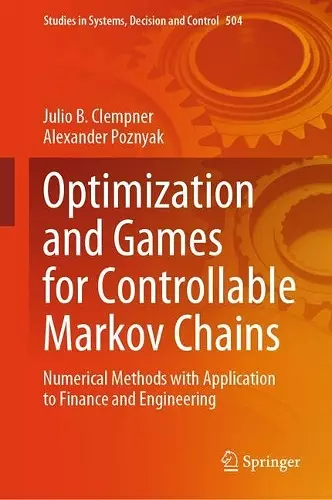Optimization and Games for Controllable Markov Chains
Numerical Methods with Application to Finance and Engineering
Alexander Poznyak author Julio B Clempner author
Format:Hardback
Publisher:Springer International Publishing AG
Published:14th Dec '23
Should be back in stock very soon

This book considers a class of ergodic finite controllable Markov's chains. The main idea behind the method, described in this book, is to develop the original discrete optimization problems (or game models) in the space of randomized formulations, where the variables stand in for the distributions (mixed strategies or preferences) of the original discrete (pure) strategies in the use. The following suppositions are made: a finite state space, a limited action space, continuity of the probabilities and rewards associated with the actions, and a necessity for accessibility. These hypotheses lead to the existence of an optimal policy. The best course of action is always stationary. It is either simple (i.e., nonrandomized stationary) or composed of two nonrandomized policies, which is equivalent to randomly selecting one of two simple policies throughout each epoch by tossing a biased coin. As a bonus, the optimization procedure just has to repeatedly solve the time-average dynamic programming equation, making it theoretically feasible to choose the optimum course of action under the global restriction. In the ergodic cases the state distributions, generated by the corresponding transition equations, exponentially quickly converge to their stationary (final) values. This makes it possible to employ all widely used optimization methods (such as Gradient-like procedures, Extra-proximal method, Lagrange's multipliers, Tikhonov's regularization), including the related numerical techniques. In the book we tackle different problems and theoretical Markov models like controllable and ergodic Markov chains, multi-objective Pareto front solutions, partially observable Markov chains, continuous-time Markov chains, Nash equilibrium and Stackelberg equilibrium, Lyapunov-like function in Markov chains, Best-reply strategy, Bayesian incentive-compatible mechanisms, Bayesian Partially Observable Markov Games, bargaining solutions for Nash and Kalai-Smorodinsky formulations, multi-traffic signal-control synchronization problem, Rubinstein's non-cooperative bargaining solutions, the transfer pricing problem as bargaining.
ISBN: 9783031435744
Dimensions: unknown
Weight: unknown
332 pages
2024 ed.